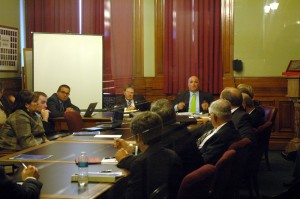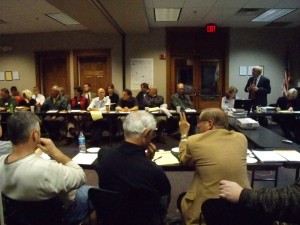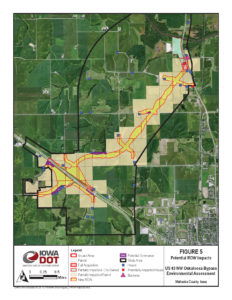Highway 63 Bypass Moving Closer To Reality
Oskaloosa, Iowa – Word came Tuesday that the bypass that would connect Highway 63 at the north side of Oskaloosa to Highway 163 on the west side of Oskaloosa had landed squarely on the Iowa Department of Transportations five-year plan.
The journey for Highway 63 improvements predate Oskaloosa News itself, and we began covering the conversation back in 2010 when the Highway 63 Coalition met regularly to lobby for improvements to the highway.
Those earliest meetings included Mahaska County Supervisors, Oskaloosa Area Chamber and Development Group, City of Oskaloosa, City of Ottumwa, Pella Area Development Corporation, City of Pella, City of Montezuma, Poweshiek County Supervisors, City of Malcom, Iowa DOT, Cargill, other employers, and concerned citizens.
During that late November meeting, the Coalition worked to bring forward ideas about transportation improvements that are needed in the area. The focus of that meeting was to have an overview of the Highway 63 transportation study that had been worked on for the last year, and some final public input before the report was finalized.
In August of 2012, the Iowa Department of Transportation voted to designated 97 miles of Highway 63 from Oskaloosa to Waterloo as part of the Iowa Commercial Industrial Network.
The Iowa Commercial Industrial Network exists to connect economic growth areas and carry a significant amount of the state’s commercial traffic.
In August of 2013, the Iowa Department of Transportation held a public meeting at the Oskaloosa Middle School for a then-proposed Highway 63 northwest bypass of Oskaloosa.
One of the major factors to build a bypass, for the Iowa DOT, was the number of crashes taking place within Oskaloosa. In the years between 2003 and 2012, there had been 459 crashes on the segment of Highway 63 within the City of Oskaloosa. That number was approximate twice the statewide average for similar roadways.

Senator Tom Rielly, Chairman of Senate Transportation Committee, discusses a proposed .10 cent gas tax increase with others on the committee. (file photo)
Tom Rielly sits on the Iowa Department of Transportation Commission, and he sat down with Oskaloosa News on Wednesday morning to talk about the next steps for the bypass project.
Rielly said that if all goes to plan, right-of-way purchasing will begin in 2023 and that by 2024, grading of the new roadway will begin. In all, it could take four to five years to complete the project.
“Hopefully by 2028, we will have a bypass around Oskaloosa,” Rielly said. “It will get the trucks out of downtown.”
“This was a good day yesterday,” Rielly said of the inclusion of the project onto the 5-year plan. “These projects just take time. There’s a lot involved in this. To get where we are now, it, first of all, it had to be recognized there was a problem. It was recognized, we did have a problem.”
“Then, what’s going to be the solution,” Rielly said was the next step. “Do you go east of town? Do you go west of town? Which is the most effective and efficient way?”
Engineering and environmental studies were completed to better understand how the problem could be solved.
Then the public hearings were held to get input, later hearings with proposed routes for more specific input.
“It just takes years to do the design, to gather the information, to do the studies. All of that has been done plus, in addition to that, you need to have support from the local communities,” Rielly explained. “Obviously this is important to the City of Oskaloosa, but it’s also important to Mahaska County, and it’s also important to New Sharon, Eddyville, and Pella.”
“There really was no reason this project should not be slated,” Rielly added of the bypass being selected by the Iowa DOT Commission.
“I would encourage we start talking about a southeast connector,” Rielly said.
Highway 92 through Oskaloosa carries more than 12,000 vehicles per day.
A southeast connector has been part of the discussion, to a limited extent, when in May of 2016, the Iowa DOT held a public hearing on the early work it’s been doing for the potential bypass.
At that point in 2016, the Iowa DOT said it could take 12 or more years for the project to land on the 5-year plan.
“Myself personally, I think there is a need for that,” Rielly said of the southeast connector. He believes that several area businesses and cities would also agree that it is an issue. “We need to start having discussions now, and how are we going to start funding some of these studies. How are we going to start choosing the best route.”
“We’ve got to start this whole process all over again because it’s going to take that amount of time,” Rielly explained on pushing the southeast connector, using the timeframe it took for the northwest bypass. “If we don’t do it now, it will never get done.”
“The DOT will not get serious about something unless the project is serious,” explained Rielly on why “local buy-in” is important to making road projects happen.
The Iowa DOT has been taking more of a regional approach to road projects, and not focusing on ones that will benefit just a single community. “It has to benefit multiple communities,” Rielly said.
In order for all of this to happen, the Federal Highway Trust Fund will have to be solvent. Typically the fund gets its revenue from taxes on gasoline and diesel, but in recent years, it’s needed a large injection of cash from the general fund to remain solvent.
The legislation that is diverting cash to the highway trust fund is set to expire next year, and the trust will run out of money in September of 2020.
Without that funding, “It would put these projects in jeopardy,” said Rielly. “We’ve been reaching out to our congressional delegations. We’ve made trips to Washington to work with them, to press them on how significant this need is. It has to be figured out, and it has to be figured out now.”
Rielly explained that if the FAST Act, which is the program that is placing general fund dollars into the highway trust, isn’t renewed, or a long term fix isn’t presented, the Iowa DOT will have to start scaling back projects. “We’re already putting projects in kind of limbo as a precaution that if Congress does not act, these projects will not get done.”
One of those ways to raise more money for the highway trust fund would be to raise the tax on fuel. Rielly has concerns about that, calling Iowa a giver state, meaning the money generated off of Iowans would find it’s way to other places, and not help Iowan’s. “A lot of gas tax that we pay in federal gas tax goes to other states. We don’t get it back.”
“We have to come up with alternatives, even if it comes back to block grants or something at the federal level, to make it so we’re not a giver state anymore,” Rielly explained. “Our Congressional Delegation has to reach out. They have to solve this problem. They can’t do it at the expense of Iowans. They have to do it to favor Iowans.”

















